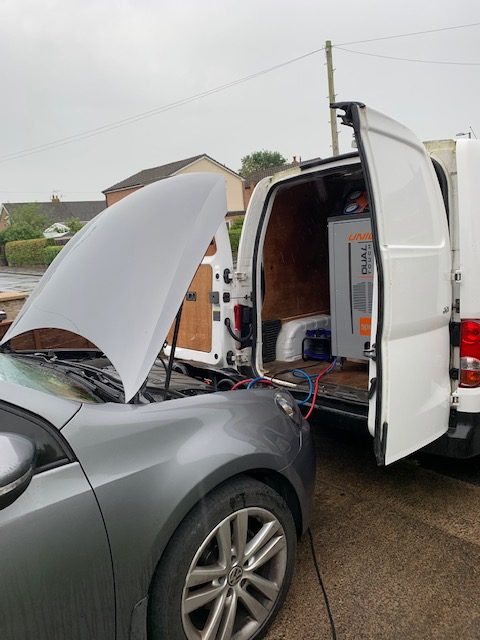
Every year, your car’s air conditioning system will lose around 10% of the refrigerant needed to keep the system operating as it should. As the level drops, the effectiveness of your air con will also reduce. That’s why we recommend a re-gas every two years to keep your air con performing at its best.
Not only are we able to recharge the more common refrigerant, r134a used in 90% of cars today. We are also able to do a R1234yf Car Air Conditioning Recharge . This newer gas is now standard on all new cars so a standard air con recharge is often not available at many A/C specialists as different equipment is needed. Contact us today if you need a R1234yf air con recharge.

R1234yf refrigerantR1234yf is a synthetic HFO (hydrofluoroolefin) refrigerant developed by DuPont and Honeywell. It is a successor to R134a for car air-conditioning systems.
The reason R1234yf refrigerant is being introduced as because it has an very low global warming potential (GWP), with a rating of less than 1. This means that one kilogram of R1234yf released to atmosphere has a significantly lower greenhouse effect than a kilogram of CO2 for example. For comparison the very widely used R134a has a GWP of 1430.
Many years of research have been carried out by the automotive industry to find a replacement for R134a, and this has culinated in the selection of R1234yf as the new standard refrigerant for new cars.
Compared with R134a, considerable upgrades to component quality and robustness, as well as compliance with a number of new safety standards, have been engineered into R1234yf systems. The systems are designed to prevent potential refrigerant leakage into the cabin.
From a service and repair standpoint, R1234yf has similar thermal properties to R134a, meaning there are only minor system layout and design differences and faults can be diagnosed using the same methods as R134a.
The biggest difference is R1234yf’s flammability rating, which means it is mildly flammable. This has implications for workplace health and safety procedures and means dangerous goods rules will apply to the storage, transport and handling of this gas. To ensure workplace safety equipment should be rated as compatible with both R134a and R1234yf.
Unlike the R12 ban of 1996, supplies of R134a will remain available for servicing existing equipment and there will be no retrofitting between R134a and R1234yf systems.
Honda and Subaru have begun to introduce the new refrigerant already with the 2017 models, General Motors plans to transition all new models to the new refrigerant by 2018.
Mobile air con regas Conditioning are equipped to service your car’s aircon with either R134a or R1234yf refrigerant and as you may not know what gas your car’s system is using (and let’s be honest why would you?), please give us a call and we would be more than happy to help.